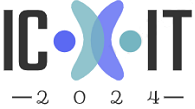Manuscripts should describe original work and should be no more than 6 pages in the IEEE double-column proceedings format, including tables, figures and references. In order to download manuscript templates for IEEE conference proceedings use the following link: https://www.ieee.org/conferences/publishing/templates.html.
Papers can be submitted directly to : https://cmt3.research.microsoft.com/IC3IT2024
At least one author of each accepted paper is required to register to the conference and present the paper. Only registered and presented papers will be published in the conference proceedings. Accepted papers will be included in the IC3IT 2024 proceedings and will be submitted for inclusion into IEEE Xplore subject to meeting IEEE Xplore's scope and quality requirements.
If you are using LaTeX, please analyze your article’s LaTeX files prior to submission to avoid delays in publishing. The IEEE LaTeX Analyzer will identify potential setbacks such as incomplete files or different versions of LaTeX.
Topics of Interest
Topics of interest include, but are not limited to:
- Artificial Intelligence (AI) and Machine Learning (ML):
-
- Advanced algorithms and techniques
- Deep learning
- Neural networks
- Natural language processing
- Computer vision
- Reinforcement learning
- Data Science and Big Data:
-
- Data analytics and visualization
- Big data processing frameworks
- Data mining and knowledge discovery
- Predictive analytics
- Data-driven decision making
- Internet of Things (IoT):
-
- IoT architectures and protocols
- IoT applications and services
- Edge computing for IoT
- IoT security and privacy
- IoT data management and analytics
- Cybersecurity:
-
- Threat detection and prevention
- Secure communication protocols
- Cryptography and encryption
- Security in cloud computing and IoT
- Cyber-physical system security
- Cloud Computing:
-
- Cloud architectures and models
- Cloud services (IaaS, PaaS, SaaS)
- Cloud security and privacy
- Serverless computing
- Cloud-native development
- Blockchain and Cryptocurrency:
-
- Distributed ledger technologies
- Smart contracts
- Cryptocurrency and digital payments
- Blockchain for supply chain management
- Decentralized applications (DApps)
- Human-Computer Interaction (HCI):
-
- User experience design
- Interaction techniques
- Accessibility in technology
- Interface design principles
- Usability testing and evaluation
- Emerging Technologies:
-
- Quantum computing
- Augmented reality (AR) and virtual reality (VR)
- Bioinformatics and computational biology
- Nanotechnology applications
- Sustainable and green computing
- Innovative Applications of IT:
-
- Healthcare informatics
- Smart cities and urban informatics
- Education technology (EdTech)
- Financial technology (FinTech)
- E-commerce and online marketplaces
- Ethical and Social Implications:
-
- Ethical considerations in AI and data science
- Privacy concerns and data protection
- Bias and fairness in algorithmic decision-making
- Socio-economic impacts of technology
- Digital divide and accessibility issues

